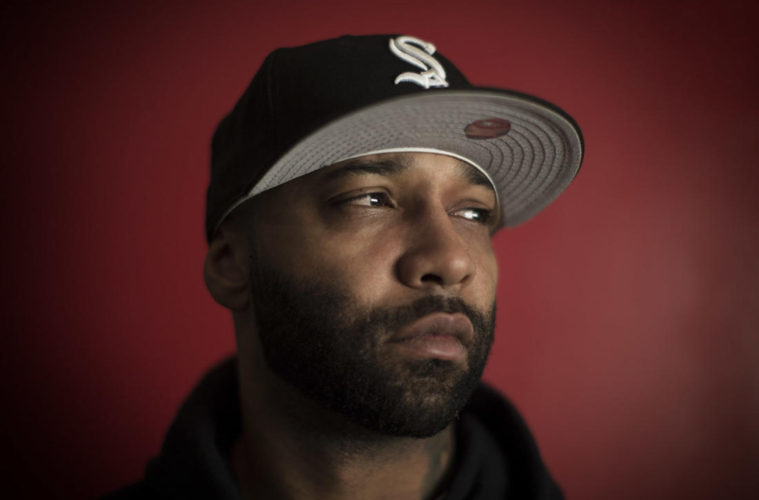Joe Budden could quite possibly be the first professional artist-critic in music – the divide between the two often antithetical professions is usually clear-cut but Joe has mastered the art of shuffling back and forth. The veteran MC is in the privileged position of being both a creator and a critique of music, and the insight he brings as a result is invaluable.
The “Pump It Up” rapper recently became a resident critic on Complex’ daily show “Everyday Struggle”, where he and YouTube commentator DJ Akademiks give their opinion on hip-hop culture. But even before that, Joe started a weekly podcast where he shares his opinion on even more topics related or unrelated to music.
Some of Joe’s opinions have landed him in hot water with his peers, including Drake and Meek Mill, but today, it’s what he’s said about Drake’s influence on global hip-hop that has gotten him in trouble once again. In trying to make the larger point that hip-hop nowadays has embraced more melody with the help of heavy-hitters such as Future and Drake, he went overboard by implying that this is the main reason why hip-hop is becoming global, sighting Africa as an example.
Watch from the 12:39 mark.
https://www.youtube.com/watch?v=fnr2fi4BYiA
All of these artists are great, all of these artists are responsible for globalizing hip-hop. Hip-hop might not necessarily be popping in Africa until Drake put a bunch of African drums in his music.
Red flag. Joe was probably referring to Drake’s flirtation with African music, in working with the likes of Wizkid, Black Coffee and Burna Boy in recent times, but there are a number of things in his quote that are problematic:
a.) Melody is the primary way hip-hop can travel to places such as Africa, presumably because Africans will struggle with the wordier forms of rap since English isn’t our mother tongue.
b.) Drake put an entire continent on to hip-hop music who weren’t necessarily listening to it before.
c.) Hip-hop to Africans equates to the use of ‘African drums’ in production.
What Joe is probably unaware of is that the Atlantic Ocean does not divide the continents of North America and Africa musically – Africans have soaked up so much American hip-hop culture, from generation Y to the millenials. It has influenced the way we dress, the way we talk, the values our young people celebrate (for better or for worse), even the way we play our indigenous music. Over time, the continent has embraced everything about hip-hop from break dancing and boom-bap all the way down to dabbing and mumble rap – we do not need a melody in 2017 before we appreciate the music.
Hip-hop has also birthed sub genres across the continent, it inspired modern forms of kwaito in South Africa in the 90’s, it helped give birth to hip-life in Ghana in the same era and found a home in Nigeria even before the days of the pioneering duo of Junior and Pretty. Furthermore, long before Drake, some of the biggest rappers in the world have performed on the continent, from Jay-Z, to 50 Cent to Ludacris, I could go on.
That said, Drake deserves credit for allowing a musical exchange in the other direction for once by featuring an African artist on “One Dance”, one of the biggest songs released last year globally. But rather than putting Africa on to American hip-hop, “One Dance” actually put American hip-hop on to Africa. It is also instructive to note that Wizkid is an Afropop singer and not a hip-hop artist and even though Drake is a rapper, there aren’t too many people who will classify “One Dance” as a ‘rap song’, so I’m lost on the African drums argument.
As expected, members of the local hip-hop community were quick to dismantle Joe’s argument on Twitter.
Nah. @JoeBudden was making a great point till he talked about Africa. Hip hop climate in Africa is built on an era before even Joe Budden
— Ebika!!! (@EbiIsQuiet) April 19, 2017
@_theboynathan @TfcknSAR @JoeBudden Hiphop in Africa has been growing rapidly over the past 10yrs, no thanks to Drake. Wayne, 50 were more of an influence than Drake.
— Alexander II (@Alex2Akande) April 19, 2017
"Hiphop may not be popping in Africa without Drake putting a bunch of African drums in his music," the ignorance from @JoeBudden
— Steve Dede (@DizSteve) April 19, 2017
Interestingly, Joe Budden has benefited from the globalization of hip-hop that he speaks about with such little perspective. I recall seeing several bootlegged copies of his self-titled debut album in local stores in 2003, at a time when users outside of America did not have access to the iTunes music store. Yet Joe’s biggest song till date “Pump It Up” still managed to cross over to the radio and clubs on this side and still features on many DJ’s throwback playlists. Even more recently, Joe worked with UK-based Nigerian producers Studio Magic on his 2012 mixtape A Loose Quarter. However, the veteran rapper might be unaware of all this, so we should give him the benefit of the doubt.
Joe Budden’s comments come from the point of view of a person who is a prisoner of time and geography, time because he’s acting like hip-hop wasn’t already a global phenomenon at least two decades before Drake even picked up a microphone and geography because he is ignorant of the impact of hip-hop in other parts of the world, especially Africa.


